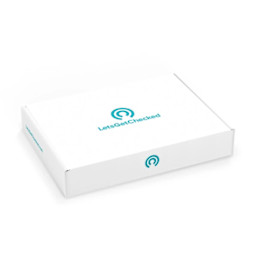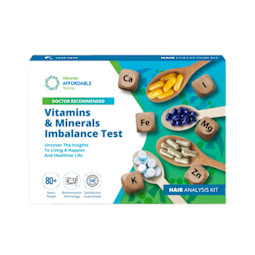The 5 Best At-Home Vitamin Deficiency Tests Of 2026, From An RN

Did you take your multivitamin today? If not, you're not alone. Nearly a third of Americans1 are deficient in at least one vitamin or mineral. Those with poor or unvaried diets are at the most risk of being deficient. An at-home vitamin deficiency test is a relatively inexpensive, accessible way to reveal which vitamins you might need to supplement in your diet.
Just keep in mind, abnormal results should always be discussed with a health care professional (and we'd still recommend asking your primary care doctor for one whenever possible).
To help make your search for a reputable home test easier, we performed an analysis of the options available and determined which stand out from the rest.
Read on to learn more about home testing and discover our picks for the best at-home vitamin deficiency tests to uncover whether you're among the millions of people not hitting their optimal levels.
The best at-home vitamin deficiency tests of 2024
Our picks for the best at-home vitamin deficiency tests
Pros
- Blood draw completed by a technician
- Can be taken by people in the state of New York
- Results available within one day (no mailing)
- Detailed
Cons
- Must go into a Lab Corp testing location
Collection method:
Blood (in-lab)Coverage:
FSA/HSAChecks levels of:
Vitamin D, B12, and B9 (folate)Result time:
1 dayIf you're on the hunt for a detailed evaluation of your vitamin D, B12, and B9 levels, then this vitamin deficiency test by Labcorp is the best pick for you. Through a simple blood test, you can get insights into your nutritional status, meaning it'll let you know of any possible gaps in your nutrition and recommend foods to help you bridge that gap. One downside, however, is that you will have to go in person to a Labcorp location to drop off your sample and recieve your results.
The testing is done in a CLIA-certified clinical laboratory that performs regular quality assurance testing to ensure the results your receive are accurate.
Labcorp also has a variety of other tests including a men's and women's health tests, hCG pregnancy test, testosterone test, iron deficiency test, and more.
Pros:
- Lots of options for testing
- Quick turnaround time
- Phone call from a nurse to review abnormal results
Cons:
- Not recommended for anyone under the age of 22
- Cannot collect sample on Fridays, Saturdays, or Sundays
Collection method:
Finger prickCoverage:
Not currently covered by health insurance, but you may use HSA or FSA accountChecks levels of:
Vitamin D, B12, EResult time:
2 to 5 daysLetsGetChecked has a range of at-home tests available, with vitamin deficiencies included in three of its kits. You can choose between a vitamin-D-specific test, an essential vitamin test (vitamin D, B12, and E), or a comprehensive test that includes all vitamins in the essential test, plus copper, selenium, zinc, and magnesium.
The brand is transparent in its guidelines; if you're under 22 years old, you'll not receive results for vitamin B12. It also limits blood sample collection days to Monday through Thursday, which you'll need to be mindful of when planning your test. The secure online portal will present your results within two to five days of sending in your sample, and you can expect a nurse to call and discuss any abnormal levels.
We tried it: mbg's own Andreas tried the LetsGetChecked Vitamin D test for himself. You can watch the full video review here.
Pros:
- Results provided in a secure app
- User-friendly directions
Cons:
- Only tests for vitamin D
- Informational video is pre-recorded & not tailored to your specific results
Collection method:
Finger prickCoverage:
Not currently covered by health insurance, but you may use HSA or FSA accountChecks levels of:
Vitamin DResult time:
5 to 7 daysEverlywell's vitamin deficiency test evaluates either your vitamin D or B levels (although the vitamin B test is currently out of stock). The tests are relatively inexpensive, although they have a slightly longer wait time for results. The brand's user-friendly packaging and directions make the whole testing experience fairly simple: You simply prick your finger with a lancet and send back your sample in a pre-labeled envelope. Your results will be delivered in a secure portal on the Everlywell app. A pre-recorded information video will help run through your results; however, it won't be personalized to your specific reading. Taking the results to your primary care physician is a great way to ensure you're actually understanding the next steps.
Pros:
- Easy hair sample method
- Tests 80+ vitamins and minerals
Cons:
- Long wait time for results
- Results may vary depending on the individual hair sample
Collection method:
HairCoverage:
Not currently covered by health insurance, but you may use HSA or FSA accountChecks levels of:
80+ Vitamins and MineralsResult time:
1 to 2 weeksIf you want a complete picture of your vitamin and mineral deficiencies, 5Strands is a great option. For only $66, your sample is tested against 80+ vitamins and minerals. The results will reveal only the nutrients you are deficient in, so you won't see any levels listed for those that are within "normal" range.
This brand is unique in that it requires just a few strands of your hair from your head rather than blood. The high-level technology uses bioresonance, which compares the light frequency of the hair sample to the electromagnetic frequencies of organic and inorganic matter.
Customer reviews are mixed on 5Strands, with the biggest complaint being that the report is very technical and hard to understand. The results give no context as to what an abnormal result means, so you will need to take your results to a health care specialist to translate (which we recommend in any case).
Pros:
- Offers a membership to retest every 3 months
- Fast results
- Formulates a vitamin supplement based on your results for an extra charge
Cons:
- Expensive
- Does not include some key vitamins
Collection method:
Finger prickCoverage:
Not currently covered by health insurance, but you may use HSA or FSA accountChecks levels of:
Vitamin B9 (folate), B12, D, hsCRP, and homocysteineResult time:
2 to 3 daysAs a brand, Rootine prides itself on being a community of health enthusiasts. The company was founded by a working mom who wanted to dive deeper into the reasoning for her chronic fatigue.
This finger prick test includes vitamin B9, B12, D, hsCRP, and homocysteine (inflammation markers), providing solid insight into potential vitamin deficiencies. Rootine is the first brand to use a genetic assessment in its algorithm to better understand each individual's unique nutrient needs—and there's also professional coaching offered.
How we picked:
Accuracy
At-home tests need to produce the same results if you were to have them done in a traditional lab. We only included brands that use CLIA-certified labs.
Price
Vitamin deficiency labs are rarely covered by insurance, so we paid close attention to price and prioritized affordable options when possible.
Sample type
While both sample types are relatively painless, some people do have a strong preference between hair or blood. We included options for both.
Vitamins tested
Some tests evaluate just one vitamin level, while others take a more comprehensive look at your deficiencies. We noted which vitamins each of our selections tests for.
Comparing the best at-home vitamin deficiency tests
| Brand | Cost | Collection method | Checks levels of | FSA or HSA elligible | Result time |
|---|---|---|---|---|---|
| LetsGetChecked | $109 | Finger prick | Vitamin D / B12 / E | Yes | 2-5 days |
| Everlywell | $49 | Finger prick | Vitamin D | Yes | 5-7 days |
| 5Strands | $66 | Hair | 80+ vitamins & minerals | Yes | 1-2 weeks |
| Rootine | $115 | Finger prick | Vitamin B9 (folate) / B12 / D / hsCRP / homocysteine | Yes | 2-3 days |
What are the types of vitamin deficiency tests?
Our bodies need 13 essential vitamins for optimal function, each of which has a specific job to do. A deficiency in one or more of these can result in the malfunctioning of various bodily functions, but each test varies slightly in the exact nutrients that it tests for.
As expected, most at-home tests don't include all 13 vitamins but instead focus on vitamins D and B. Vitamin D is one of the most important vitamins to test for since it's estimated a billion people worldwide are vitamin D deficient (and women are 11% more likely to be lacking in this vitamin). The common deficiency means every test on our list measures vitamin D levels—but many also explore other essential nutrients.
There are two sample types used for at-home tests: a finger prick (by a very small needle called a lancet) or a hair sample.
Finger prick: With this method, you'll put drops of blood into a small vial or tube, which is then packaged up and mailed back to the lab. The needle is small, so it's relatively painless. However, filling the vial does require a decent sized sample—if you're squeamish around blood, doing this at home may not be your best bet.
Hair sample: This method requires just a few strands of hair pulled from your head. While many prefer the ease of the hair sample, this sample type is generally not as reliable as blood tests and will not be suitable for someone who is bald. Additionally, hair samples may not be accurate for someone who dyes their hair or uses chemical treatments, such as keratin.
Are at-home vitamin deficiency tests accurate?
Most at-home brands use the same Clinical Laboratory Improvements Amendments (CLIA) certified labs as doctor's offices and hospitals, so these tests are generally just as accurate. They're subject to the same clinical and accuracy standards and if performed correctly will give the same level of accuracy.
On that note, however, user error can come into play when using any at-home test. As U.K.-based medical provider and health enthusiast Michael Njunge notes, finger prick testing is only accurate if it's done correctly. The blood needs to be taken from the right body part at the right time of day without contamination. For some, this can be a difficult task. If the blood sample is altered in any way, the results will be inaccurate.
What are the signs of a vitamin deficiency?
Symptoms of a vitamin deficiency vary widely depending on which vitamin you're lacking, but some common signs include fatigue, skin changes, brain fog, weight loss, change in bowel habits, and generalized aches and pains, per Njunge.
The simplest way to think about deficiency? Reverse the benefit of that specific vitamin. For example, vitamin D is essential for bone health (among many other things). Njunge explains that a deficiency in vitamin D causes a loss of bone density, resulting in bones that can break easily.
Why addressing a deficiency is important for your longevity
Vitamins are essential for key bodily functions, such as cell activity, synthesis for mood neurotransmitters, muscle contractions, and more. A vitamin deficiency will deplete these processes and can lead to serious complications. Depending on which vitamin you are lacking, your symptoms will be different. For instance, a low B12 can cause enlarged red blood cells that do not work properly, resulting in a lack of oxygen to essential organs.
The good news is that most vitamin deficiencies can be prevented or managed. Eating a healthy, varied diet is the best way to make sure you are getting all your required vitamins. Sometimes this is not possible based on food availability or geographical location or if the individual does not have optimal GI absorption. The next best option is to enhance your nutrient intake with high-quality vitamins and supplements.
Holistic vitamin expert Pamela Peeke, M.D., MPH, confirms that supplements are a convenient way to fill nutritional gaps since even the healthiest Americans can fall short in their dietary intake. Supplements offer a practical preventive path to maintaining good health, as well as a solution to known deficiencies.
FAQ
Is there a test to see what vitamins you are lacking?
Yes, there are vitamin tests to determine a deficiency in essential nutrients. At-home tests are a great way to discover any deficiencies from the comfort of your home. That said, it's always best to discuss these results with your doctor.
What is the best vitamin test?
The best vitamin test depends on what you are looking for. The most comprehensive test is by 5Strands, but the test with the best integration into care is Rootine.
How can I check all my vitamin levels?
The only test on our list that covers all 13 essential vitamins is 5Strands. However, it is recommended to discuss any symptoms you may be having with a health care professional to determine the appropriate test needed.
Is there a blood test to check vitamin levels?
Most of the at-home tests use a finger prick, allowing a few drops of blood to be captured in a tube or vial for testing.
What causes a vitamin deficiency?
Most essential vitamins are naturally consumed when we have a healthy, balanced diet. Genetics and medical conditions can also play a role in your body's absorption of vitamins.
The takeaway
The convenience of at-home vitamin testing allows anyone who can afford it to find out if they are deficient in key nutrients, without heading to an office or a lab. However, at-home tests should not be used to diagnose and do not take the place of traditional health care. If you are having any severe symptoms, you should always consult with a health care professional. This list of the best at-home vitamin deficiency tests should provide some guidance when it comes to picking the right test for you. Since vitamin D is the most common deficiency, learn what an endocrinologist recommends to do to reach optimal levels.






